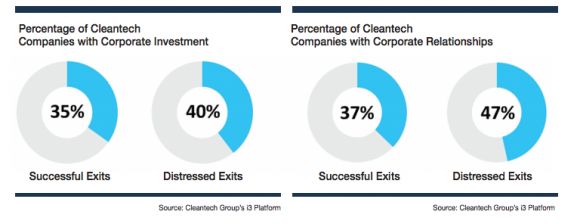Speaking at a recent energy innovation summit in Washington, D.C., William Caesar, an executive at Waste Management, declared that a lot of inventors and entrepreneurs are "screwed."
While the inherent challenges of building a company or commercializing a new technology certainly aren't news to startups, the context of Caesar's comments is notable.
Since 2007, Waste Management has made over two dozen investments in companies developing new recycling techniques, biofuels, chemicals and plasma gasification technologies. But with "no successes" so far, the company is restructuring its portfolio, divesting from some startups and looking to technologies that are closer to commercial scale.
If a massive waste services corporation with strong technical expertise, deep sales channels, and a market capitalization of $21 billion can't bring an innovative startup to scale, who can?
With only a handful of successful public exits in the cleantech space, a lot of entrepreneurs are looking to corporate partnerships or full-on acquisitions as an attractive opportunity to scale. Google's recent $3.2 billion acquisition of Nest was seen as the pinnacle of this trend -- a progressive corporate tech leader flush with cash buys an innovative startup and helps it attempt to take over the world of home automation. Could a startup ask for more?
But that acquisition was unique. Nest and Google already have a very similar culture and vision. And although hardware is central to Nest's business, its path to scale is far less capital-intensive than your typical cleantech company. Heck, some observers aren't even convinced that the Google-Nest partnership is a cleantech play at all.
The reality for most startups is that they won't be the next Nest -- they'll likely end up like CSP developer eSolar, or like the enhanced geothermal companies Potter Drilling and AltaRock.
Those three companies collectively pulled in tens of millions of dollars in R&D support from Google back in 2007 as part of the RE<C Initiative. But Google eventually ditched that strategy because the engineering and capital needs were too much to support. Like Waste Management, Google decided to invest in energy companies that were already close to commercial scale.
Anecdotes don't prove a trend. However, the data shows that this experience is common across the entire sector.
Last year, the Cleantech Group put out a report analyzing the relationships between cleantech startups and corporate investors. The group analyzed 86 corporate deals with cleantech startups over the last decade and found that distressed exits for both partnerships and direct investments were more common than successful ones, as this figure shows.

The report offers a fairly intuitive take on why startups and large corporations don't always succeed together: different cultures, timescales, approaches to leadership and growth strategies are all potential points of conflict.
"Almost by definition, startups are willing to assume risks that their far more mature brethren would shun," write the authors. "Corporates are often willing to engage in disruptive early-stage R&D efforts, but moving such R&D out of the lab and into full-scale growth mode is typically seen as far more difficult in a corporation facing conflicting objectives and internal competition for corporate budget."
And when it comes time to face those difficulties when attempting to truly scale, clashes over risk acceptance can be a problem: "Startups are typically singularly focused and thus also risk a far more binary outcome between success and complete failure. The personalities of the executives and the employees best equipped to handle such binary outcomes are less likely to be successful in a more structured corporate environment."
This isn't to say that startups engaging with corporates on R&D, joint ventures or equity investments are destined to fail. Pulling in a corporate investor can be critical for companies seeking new sales channels, validation of their technology or trying to get a better sense of what's happening in the market. However, as corporations fill in the gap left by traditional venture capitalists pulling out of capital-intensive cleantech, positive results are far from assured.
"There is not one silver bullet to developing a successful corporate relationship -- in short, it’s complicated. Corporate partnerships can be mutually beneficial to all parties, but simply having a partnership does not necessarily equate with success," concluded the authors.
Finding a corporate investor can be a big step for startups. But that doesn't insulate them from eventually getting "screwed" by market realities or poor matchmaking.



